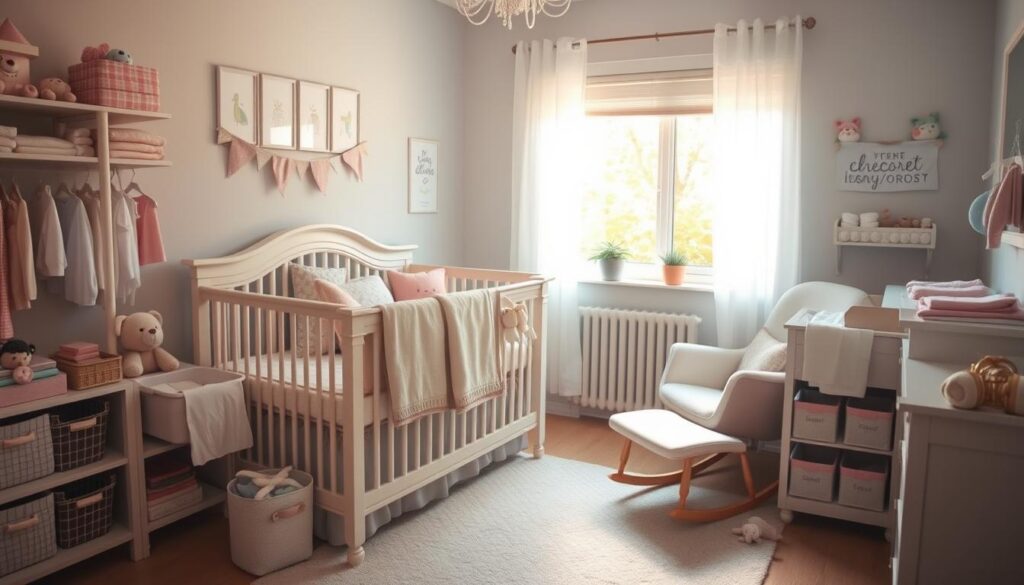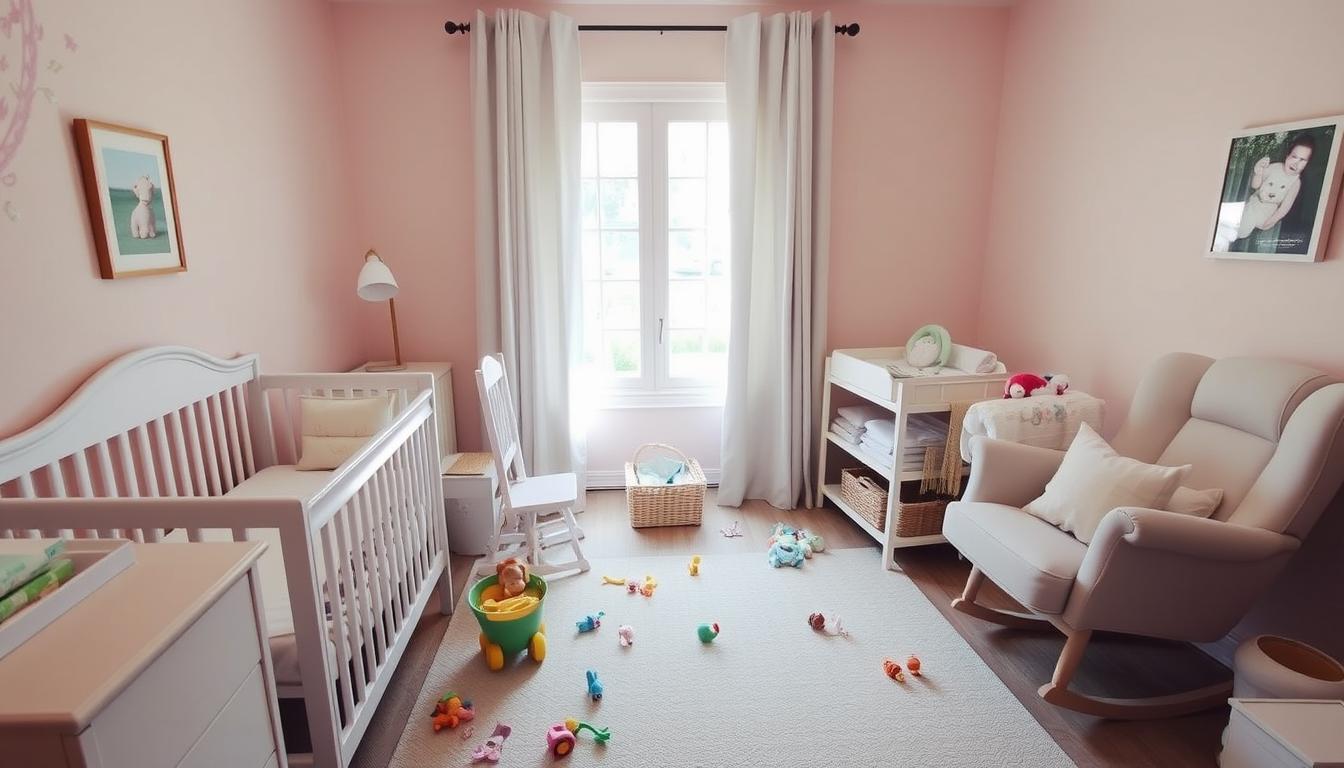Welcoming a new baby is exciting but can also be daunting. If you’re expecting your second child, you face unique challenges and emotions. This guide offers tips and strategies to help you prepare for your new baby. It ensures a smooth transition for your growing family.
Contents
- 1 Understanding the Emotional Transition
- 2 Involve Your Firstborn in the Process
- 3 Reassess Your Living Space
- 4 Essentials for a New Baby
- 5 Finances: Budgeting for Two
- 6 Planning Your Birth Experience
- 7 Ensuring Sibling Bonding
- 8 Preparing for a Smooth Transition
- 9 Stocking Up on Supplies
- 10 Meal Planning for New Parents
- 11 Managing Your Time Effectively
- 12 Conclusion: Embracing Your Growing Family
- 13 FAQ
- 13.1 How can I emotionally prepare for a second baby?
- 13.2 How can I involve my firstborn in the process?
- 13.3 What should I consider when reassessing my living space?
- 13.4 What essential baby items do I need to prepare for?
- 13.5 How can I prepare my finances for a second child?
- 13.6 How can I plan for a positive birth experience?
- 13.7 What can I do to foster a strong bond between my children?
- 13.8 How can I ensure a smooth transition for my family?
- 13.9 What supplies should I stock up on?
- 13.10 How can I prepare meals for the postpartum period?
- 13.11 How can I manage my time effectively with two children?
Key Takeaways
- Understand the emotional journey of transitioning to a family of four
- Involve your firstborn in the preparation process to foster sibling bonding
- Reassess your living space to accommodate the needs of a new baby
- Create a financial plan to budget for the increased costs of a second child
- Establish a routine and discuss expectations with your partner to ensure a smooth transition
Understanding the Emotional Transition
Welcoming a new baby can be thrilling yet complex, especially for those adjusting to a new sibling. As you start this journey, it’s important to understand and deal with the emotions you’ll face during the postpartum recovery.
Acknowledge Your Feelings
It’s normal to feel a mix of joy, excitement, anxiety, and even resentment. These feelings are valid and should be acknowledged. Take time to think about your emotions and don’t hesitate to seek support from loved ones.
Discuss with Your Partner
Open and honest talk with your partner is crucial during this time. Share your concerns, fears, and hopes openly. Work together to manage the household, care for the children, and keep your relationship balanced.
Support from Friends and Family
- Ask for help with tasks like meal prep, childcare, or household chores from your support network.
- Join a new parents’ support group or connect with other families going through the sibling transition.
- Lean on your loved ones for emotional support, advice, and a listening ear when you need it most.
Remember, the sibling transition is a big life event. Approach it with patience, self-compassion, and a willingness to adapt. By acknowledging your feelings, talking openly, and seeking support, you can navigate this exciting chapter with confidence and ease.
“The transition to a second child is a major life event, but with the right mindset and support, it can be a joyous and rewarding experience.”
Involve Your Firstborn in the Process
When you’re expecting a new baby, it’s key to include your firstborn. This makes them feel part of the family. It also makes the transition smoother and strengthens your family bond.
Preparing Them for Change
Talk to your firstborn about the changes coming. Tell them a new baby is on the way. Let them share their feelings and reassure them they’re loved and important.
Choosing a Special Gift
Let your firstborn pick a gift for the baby. This makes them excited and gives them a sense of pride. Let them choose something they think the baby will like.
Creating a Big Brother/Sister Role
- Talk about what it means to be an older sibling. They can set a good example and help out.
- Help them make the nursery welcoming. They can pick out a blanket or toy for the baby.
- Get them involved in planning family activities. This includes the new baby, making everyone feel included.
By letting your firstborn be a part of the process, they’ll feel important and excited. This makes the whole family’s journey into family planning better.

Reassess Your Living Space
Getting ready for a new family member is a great time to check your home. Declutter, organize, and set up special areas. This makes sure your home meets your growing family’s needs.
Declutter and Organize
Start by decluttering and organizing your home. Sort through each room, getting rid of things you don’t need anymore. This clears space and makes your mind feel clearer. Think about donating, recycling, or selling items that are still good but not needed.
With a new baby coming, you might need a shared area for your kids. You could turn a spare room into a shared space or change an existing one. The goal is to make a place where your kids can play, rest, and grow together.
Designate Areas for Play and Rest
- Make a play area with toys and activities that are right for their age.
- Find a cozy spot for rest and relaxation, where your kids can take a break.
- Use furniture and storage that can change with your kids’ needs.
By carefully looking at your living space, you’re on your way to a cozy home for your family.
“A well-organized home is the foundation for a peaceful and harmonious family life.”
Essentials for a New Baby
Preparing for a new baby is exciting but can feel overwhelming, especially if you already have kids. As you wait for your second child, check your baby gear. See what you need to buy new. This way, your home will be ready for your growing family.
Review Your Baby Gear
Begin by checking your storage for your baby’s clothes, toys, and more. Decide what’s still good to use again. Make a list of what you need to buy or replace. This helps you shop smarter and avoid buying too much.
Consider Hand-Me-Downs
Using hand-me-downs from friends or family can save you money. Ask around to see if anyone has gently used items to share. It’s a smart way to start preparing for your baby without spending a lot.
Make a Checklist of Needed Items
- Clothing (onesies, pajamas, socks, etc.)
- Feeding supplies (bottles, breast pump, burp cloths)
- Diapering needs (diapers, wipes, diaper bag)
- Sleeping essentials (crib, mattress, bedding)
- Bathing items (baby tub, towels, washcloths)
- Safety gear (car seat, baby monitor, outlet covers)
- Soothing items (pacifiers, swaddle blankets, white noise machine)
Creating a detailed checklist ensures you have everything for your baby. It makes you feel ready and organized. This is key as you welcome your new addition.
Finances: Budgeting for Two
As your family grows, it’s important to look at your money again. Budgeting for a baby can feel hard, but you can handle it with a good plan. This way, your family’s money will stay safe.
Calculate Increased Costs
First, think about the extra money you’ll need for a baby. This includes childcare arrangements, which can take up a lot of your budget. Look into daycare, nannies, or in-home care to find what works best for you.
Other costs to think about are budgeting for baby things like diapers, formula, clothes, and medical bills. Make a list of these costs to understand what you’ll need financially.
Review Your Childcare Options
- Check out local daycare centers and their prices.
- Think about hiring a nanny or au pair, and remember to include their pay and any extra costs.
- Look into in-home care from family or trusted friends.
- Think about the good and bad of each option to find the best one for your family and budget.
Consider Savings Strategies
Good budgeting for baby also means saving smartly. Start a special savings account for your child and put money in it regularly. Also, look into tax-advantaged accounts, like a 529 plan, for your child’s future education.
By planning your money well, looking at childcare options, and saving smartly, you can welcome a new family member with confidence. Stay organized, focus on your family’s needs, and get financial advice if you need it.
Planning Your Birth Experience
Preparing for your newborn’s arrival means planning your birth experience carefully. You’ll want to look into different birthing options, take prenatal classes, and make a birth plan.
Discuss Your Birthing Options
Think about the birthing methods you might choose, like natural childbirth, epidural, or a Cesarean section. Talk to your healthcare provider about these options. They can tell you about the benefits, risks, and what to expect.
This helps you make a choice that fits your wishes and needs.
Attend Prenatal Classes Together
Going to prenatal classes with your partner is a great way to get ready. These classes cover important topics like newborn preparations and postpartum recovery. You’ll learn how to cope with pain, practice breathing, and understand the birthing process together.
Consider a Birth Plan
- Write down your preferences for pain management, labor support, and the postpartum period.
- Talk about your birth plan with your healthcare provider. Be ready to make changes if needed.
- Share your birth plan with your birthing team. This includes your partner, doula, or any other support people.
Planning your birth experience can lead to a positive and empowering birth. It’s also important to think about your firstborn’s needs. Remember, being flexible and communicating well with your healthcare team is crucial.

“The birth of a child is the greatest contribution a woman can make to the continuation of the human race.”- Fredrik Backman
Ensuring Sibling Bonding
Welcoming a new baby can be thrilling but also scary for an older sibling. As parents, it’s key to help your kids bond and adjust to the change. Here are some ways to make sure your kids get along well.
Schedule One-on-One Time
Make sure to spend quality time with your firstborn. This shows them they’re still important to you, even with a new baby. Take them on fun trips, read their favorite books, or do things they love.
Plan Family Activities
Plan activities that everyone can enjoy. This helps your kids bond and makes memories together. You can go on outings, have game nights, or cook meals together.
Encourage Healthy Interactions
Make sure your kids have a good place to interact and learn from each other. Encourage them to play, share, and solve problems together. Teach them how to communicate well to build a strong bond.
The sibling transition is a journey. With patience and effort, your kids can form a lifelong bond. By focusing on family planning and creating bonding moments, your family will grow stronger.
Preparing for a Smooth Transition
Welcoming a new baby is both exciting and challenging. As you get ready for your growing family, focus on setting routines and talking with your partner. Also, don’t forget to get help when you need it. This approach helps with a smooth recovery and keeps your work and family life in balance.
Establish a Routine
Having a daily schedule can bring stability to your home. Include times for feeding, naps, and family activities. This helps your baby adjust and promotes good sleep.
Discuss Expectations with Your Partner
Talking openly with your partner is crucial during this time. Discuss who will do what, like changing diapers and cleaning. Agree on your goals and be ready to adjust as needed for a peaceful home.
Seek Professional Help if Needed
- Think about getting help from a postpartum doula or lactation consultant for caring for your baby.
- If you’re feeling down or anxious, talk to a mental health expert about postpartum depression.
- Join support groups, online or in-person, to meet other new parents and share stories.
By tackling these challenges early, you can create a caring space for your family. This ensures a smooth start to parenthood.

Stocking Up on Supplies
As your due date gets closer, it’s key to have all the baby supplies ready. You’ll need everything from feeding items to diapering essentials. Making a list of baby essentials will make you feel ready and organized for the first few weeks.
Essentials for Feeding and Diapering
Make sure you have bottles, nipples, and burp cloths for feeding. Also, get diapers, wipes, and diaper rash cream for diapering. A checklist will help you see what you have and what you need to buy.
Inventory of Previous Items
If you’ve had a baby before, check your old baby gear. See if car seats, strollers, and clothes are still good. This way, you’ll know what you can reuse and what you need to buy new baby essentials for newborn preparations.
Consider Future Needs
Your baby’s needs will change as they grow. Think about what you’ll need in the future, like bigger clothes or different feeding items. Planning ahead can save you time and stress.
By checking what you have, buying what you need, and thinking about the future, you’ll be well-prepared for parenthood.
Meal Planning for New Parents
Being new parents can be tough, especially with postpartum recovery and balancing work and family. Planning meals ahead can help a lot. You can make tasty, healthy meals that are easy to grab when you’re busy. This way, you can fill your freezer with meals you can quickly reheat and keep healthy snacks ready to keep you going.
Easy Meal Ideas to Freeze
- Hearty soups and stews that freeze well, like chicken noodle or lentil chili
- Casseroles like lasagna or shepherd’s pie, which can be portioned and frozen
- Whole grain pasta dishes with homemade sauces that can be quickly reheated
- Slow-cooker meals like pulled pork or chicken that can be shredded and used in various dishes
Healthy Snacks for Energy
- Greek yogurt with fresh fruit and a sprinkle of granola
- Hummus with carrot and cucumber sticks
- Hard-boiled eggs for a protein-packed pick-me-up
- Trail mix with nuts, seeds, and dried fruit
Also, think about starting a meal train with friends and family. This lets them help by bringing you meals on different days. It means you get to eat well without worrying about cooking during the postpartum time.
“Proper nutrition is crucial for postpartum recovery and maintaining energy levels. By planning ahead, you can free up time and focus on the important task of bonding with your new baby.”

It’s all about finding what works for your family. With a bit of creativity and planning, you and your partner can enjoy this new chapter of your lives, well-fed and happy.
Managing Your Time Effectively
Welcoming a new baby is exciting, but it also brings new challenges. Finding a good work-life balance is key. It helps you care for your family and keep up with your own life. Good time management can reduce stress and make the transition smoother.
Prioritize Tasks Around the House
Household tasks can pile up fast with a new baby. Start by picking the most important tasks. Make a daily or weekly checklist to stay on track. Ask your partner or older kids to help out, too.
Use a Family Calendar
Keep everything organized with a family calendar. It tracks appointments, childcare, and personal plans. This helps you plan and avoid conflicts. Get your family involved to share the responsibility.
Learn to Delegate Responsibilities
Trying to do everything yourself can burn you out. Look for tasks you can pass on to others. This could be your partner, family members, or even hired help. It saves time and lets others help with your family.
By focusing on what’s important, using a calendar, and delegating tasks, you can manage your home better. This way, you’ll have more time to enjoy moments with your new baby and your first child.
“The key to work-life balance is to not see it as a balance, but as an integration.” – Sheryl Sandberg, Chief Operating Officer of Facebook.
Conclusion: Embracing Your Growing Family
Welcoming your second child brings excitement and a bit of worry. Expanding your family is both joyful and tough. But with good planning and a positive attitude, you can handle it well.
Your first child will soon become a big sibling. Including them in the preparations can strengthen your children’s bond.
Handling two little ones might seem hard at first. But focus on creating a caring space for your family to grow. Set routines, share tasks, and ask for help from your loved ones.
Every adjustment you make now will help your family adjust better. It will also create lasting memories.
Start this new chapter with joy and open arms. The love and laughter your children bring will be worth any challenge. Trust in your parenting skills as you watch your family grow.
With determination and a bit of grace, you can enjoy the journey of welcoming your second child.
FAQ
How can I emotionally prepare for a second baby?
Start by acknowledging all your feelings about having another child. Talk to your partner about any worries you have. Also, reach out to friends and family for support. This will make the emotional shift easier.
How can I involve my firstborn in the process?
Talk to your firstborn about the new baby and what it means. Let them pick a special gift for the baby. Make them feel special by giving them a “big brother/sister” role. This will make them excited for the new addition.
What should I consider when reassessing my living space?
Start by decluttering and organizing your home. Create spaces that everyone can share. Make sure there are areas for play and rest. This will help your home feel more spacious for your growing family.
What essential baby items do I need to prepare for?
First, check what baby gear you already have. Look into hand-me-downs or second-hand options. Make a list of what you need. This way, you won’t buy too much and will be ready for your baby.
How can I prepare my finances for a second child?
Calculate how much more money you’ll need for the baby. Look into childcare options and find ways to save money. This will help you budget for your family’s growing needs.
How can I plan for a positive birth experience?
Talk to your healthcare provider about your birth options. Take prenatal classes with your partner. Make a birth plan that fits your wishes. This will help you feel more in control and prepared for the birth.
What can I do to foster a strong bond between my children?
Spend quality time with each child separately. Plan activities that everyone can enjoy together. Encourage them to interact positively. This will help them develop a loving relationship.
How can I ensure a smooth transition for my family?
Create a routine for your family. Talk to your partner about what to expect. If needed, get professional help. This will help keep your household balanced and harmonious.
What supplies should I stock up on?
Check what baby supplies you already have. Stock up on essentials for feeding and diapering. Think about what you’ll need in the future. This will save you from last-minute shopping and ensure you’re prepared.
How can I prepare meals for the postpartum period?
Prepare meals that can be frozen for later. Stock up on healthy snacks. Consider setting up a meal train with friends and family. This will help you stay nourished during the busy postpartum time.
How can I manage my time effectively with two children?
Prioritize tasks around the house. Use a family calendar to keep track of everyone’s schedule. Learn to delegate tasks. This will help you balance your family’s needs and your own commitments.

